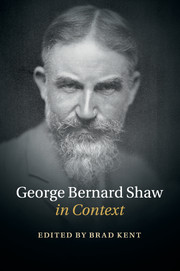Book contents
- Frontmatter
- Dedication
- Contents
- List of illustrations
- Notes on contributors
- Preface
- Acknowledgements
- A Chronology of Shaw's Works
- List of abbreviations
- PART I PEOPLE AND PLACES
- PART II THEATRE
- PART III WRITING AND THE ARTS
- PART IV POLITICS
- 24 Censorship
- 25 Empire and nationalism
- 26 Feminism
- 27 Irish politics
- 28 Socialism
- 29 Totalitarianism
- 30 War
- PART V CULTURE AND SOCIETY
- PART VI RECEPTION AND AFTERLIFE
- Further reading
- Index
- References
24 - Censorship
from PART IV - POLITICS
Published online by Cambridge University Press: 05 October 2015
- Frontmatter
- Dedication
- Contents
- List of illustrations
- Notes on contributors
- Preface
- Acknowledgements
- A Chronology of Shaw's Works
- List of abbreviations
- PART I PEOPLE AND PLACES
- PART II THEATRE
- PART III WRITING AND THE ARTS
- PART IV POLITICS
- 24 Censorship
- 25 Empire and nationalism
- 26 Feminism
- 27 Irish politics
- 28 Socialism
- 29 Totalitarianism
- 30 War
- PART V CULTURE AND SOCIETY
- PART VI RECEPTION AND AFTERLIFE
- Further reading
- Index
- References
Summary
Censorship was a constant threat throughout Bernard Shaw's long career. Even in liberal democracies, works now recognised as modern classics were bowdlerised and banned; publishers and writers were prosecuted in trials; theatres were picketed and raided; and books were withdrawn from shelves and burned in the streets by moral activists, librarians, and booksellers if they happened to go undetected by customs and police officers. In Britain, repression was felt most strongly in the theatre, which resulted in the stage's intellectually impoverished state towards the end of the nineteenth century.
This had not always been the case: until the early eighteenth century, the theatre had drawn most of Britain's top literary talents. However, when Henry Fielding staged a relentless string of popular plays satirising government corruption, Sir Robert Walpole's government passed the Licensing Act of 1737. Thereafter, theatre managers were required to submit scripts to the Lord Chamberlain for approval, causing serious writers to flock to the nascent genre of the novel. While the initial intent of theatre censorship had been to curtail political critique, over time successive changes in personnel led to wide and varying interpretations of what was deemed appropriate for the stage. As a result, plays were cut or rejected because of their treatment of politics, or their depictions of nationality, crime, professions, sexuality, religion, race, and class. Yet the authorities deliberately banned plays not only to prevent them from being performed but also to discourage other authors from taking up their pens.
By the late-Victorian period, the stifling of the stage had frustrated the intelligentsia and cultural élite enough that a broad resistance coalesced, with Shaw playing a prominent role. Three productions in particular became defining moments of the era. The first of these occurred in 1886, when the Shelley Society, with Shaw serving as press officer, organised a members-only performance of P. B. Shelley's banned horror-incest play The Cenci (1819). Such private performances became the tactic of choice for those seeking to circumvent the law as they were outside the Lord Chamberlain's control. The Independent Theatre Society followed in these lines in 1891 with Ibsen's Ghosts (1881), which had been banned for its portrayal of incest and venereal disease.
- Type
- Chapter
- Information
- George Bernard Shaw in Context , pp. 199 - 206Publisher: Cambridge University PressPrint publication year: 2015



